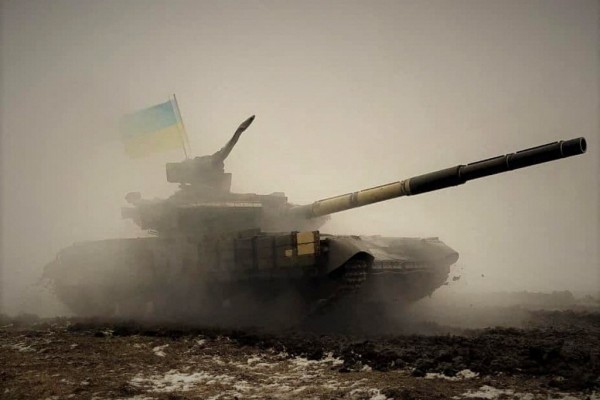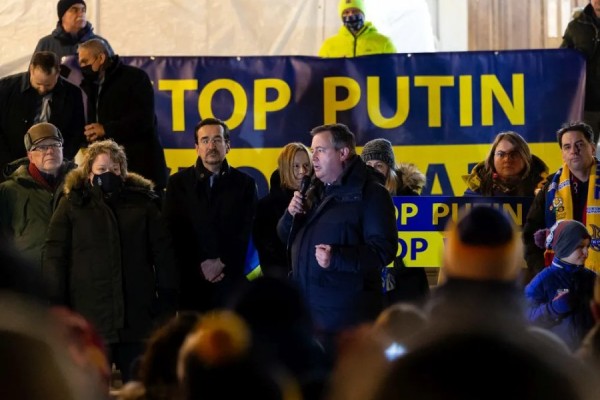-

A realist take on the Ukraine war
Realism is an approach to the study of international relations. Its main assumptions are that all nation states seek security within an anarchic international system, and that decision makers tend to act in a rational manner. This way of looking at the world can provide useful insights that cut through emotional responses and the distortions of propaganda.
-
Waltzing toward Armageddon with the merchants of death
Peace has been sacrificed for US global hegemony. Peace could have seen state resources invested in people rather than systems of control. It could have allowed us to address the climate emergency. But we cry peace, peace, and there is no peace. Nations frantically rearm, threatening nuclear war. They prepare for the worst, ensuring that the worst will happen.
-

Debunking the myth of Canada’s non-involvement in the Iraq war
As the world considers the horrific legacy of the US-led invasion of Iraq, it is time we recognize that Canada was not an innocent bystander. Despite Jean Chrétien’s nationalist grandstanding and the red-faced anger of conservative militarists who felt cheated out of some old-fashioned imperialist bloodletting, Canada did participate extensively in the 2003 invasion.
-

Guns n’ gas: the German government’s response to Russia’s invasion of Ukraine
As Vladimir Putin amassed troops near the Ukraine border, Joe Biden pressured Olaf Scholz to cut natural gas imports from Russia. Yet Scholz put diplomacy before sanctions and sabre-rattling. Then came the turnaround: two days after Russia’s invasion, Germany cancelled the Nord Stream 2 pipeline and announced its largest rearmament program since the Second World War.
-

Stop this imperialist war
We must press the war masters on all sides to negotiate for peace since there’s no social justice, no democracy, and no livable ecology for the common good on a war-levelled planet. But we must also wage a people’s war on class rule and oligarchs of all national stripes for it is the chaotic and soulless capitalist order that most fundamentally gives rise to modern imperial war in the first place.
-

Sanctions against Russia are hurting ordinary people in Central Asia
While some observers may endorse sanctions against Russia as a humanitarian alternative to military action, the supposedly bloodless and “targeted” punishment of sectors of the Russian economy has already had wide-ranging effects on people inside and outside of Russia who have committed no crime, and who simply want the best possible life for themselves and their family.
-

Ukraine: How to avoid escalation and end the war
The worst is still avoidable in Ukraine. If a settlement is to be found, the White House should urgently restore high-level dialogue with the Kremlin. The main goal must be to facilitate peace in Ukraine with a view to maintaining shared security in wider Europe and beyond—not to simply punish or isolate Putin and engage in full-scale financial war with Russia.
-

Fifteen bad Ukraine narratives
Especially when deepened by the fog of war, idiocy comes in many mutually reinforcing forms. Here, writer and social critic Paul Street examines fifteen bad narratives running around the intertwined media, Internet, and political cultures regarding the crisis unfolding in Ukraine to examine and get past some problematic thinking on Russia’s criminal invasion of its neighbour.
-

The greatest evil is war
Yes, the Russians were baited. But they reacted by pulling the trigger. This is a crime. Their crime. Let us pray for a ceasefire. Let us work for a return to diplomacy and sanity, a moratorium on arms shipments to Ukraine and the withdrawal of Russian troops from the country. Let us hope for an end to war before we stumble into a nuclear holocaust that devours us all.
-

No, opposing pipelines does not make you a Putin stooge
When it comes to Canadian oil, the “Putinist” smear is only the newest stage in a series of attempts to discredit largely Indigenous-led anti-pipeline protest movements. And it’s not just the ramblings of Jason Kenney—one of Canada’s prominent think tanks has also endorsed that view, foreshadowing the character of the Canadian elite’s newest assault on land defenders.




